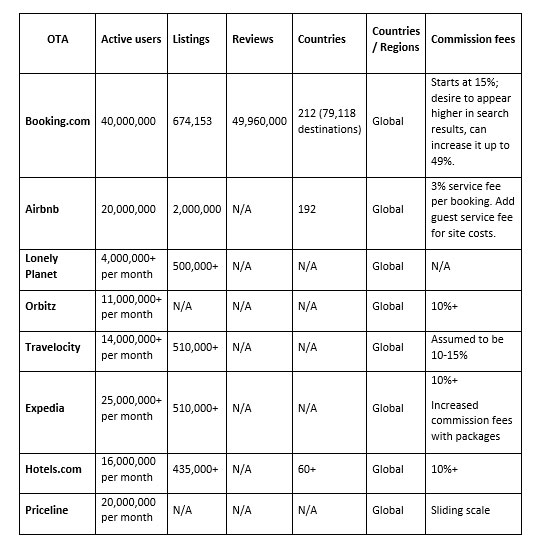Online travel agencies, or OTAs, were originally designed to sell excess inventory in times of slow demand. Today, OTAs drive the majority of bookings around the world and are an essential and integral resource in marketing your hotel.
The challenge is deciding which OTAs to link up with. There are so many variables, questions, opportunities and threats that your choice could very well affect the direction your business takes.
In an effort to make life a little easier for hotel and guest house operators, we’ve compiled an overall guide that explores the most important aspects of the most popular OTAs. There are varying commission levels, target markets, numbers of users, numbers of reviews, and many other elements to consider.
Why do travelers use OTAs in preference to other channels?
It has never been easier for consumers to compare different travel options side-by-side in terms of price, time, and location. For example, someone traveling to Zanzibar can obtain all the information they need about Zanzibar travel agents just by visiting a website, viewing the options, and seeing what fits their requirements.
Not only can consumers find a multitude of travel options, but they can also read trusted reviews and obtain accurate local information. Consumers trust the leading OTAs, which are recognized as thought-leaders. Hoteliers leverage OTA’s brands when they list their properties and hotel reservation sites with them.
Hoteliers and hostel owners – particularly the smaller ones – now have access to markets they could never have hoped to reach in the past.
The Main Players
Four major brands control the OTA market. Expedia, Priceline, Orbitz Worldwide, and Travelocity control about 95% of the market in the United States. Recently, Expedia acquired Travelocity and announced plans to buy Orbitz.
Expedia also owns hotels.com, which has 16 million monthly users. While Priceline, which enjoys 40 million monthly users, owns Booking.com, by far the largest player in the OTA space.
OTAs provide additional resources simply unavailable to most hoteliers. They create a range of online experiences including currency conversions, language support, and tailored options based on purchasing habits. OTAs offer hoteliers access to non-brand loyal travelers, younger travelers, and the packaged traveler.
Hoteliers and consumers have access to much more than a distribution channel. When guests discover hotels on OTAs, most of them do further research about the hotels using search engines, leading to direct website traffic, and increased direct reservations for hotels through their booking engines.
The Best Use of OTAs
Hotels spend 6-9% of their revenue on sales and marketing, while OTAs spend 35-40%. This gives them much more clout in the market.
A room booked on an OTA will create future booking opportunities, invoking the loyalty effect. If a guest has a good experience with a particular OTA, that same one would probably be their first choice for their next trip.
Which OTAs Fit Your Business?
Finding the best fit can be time-consuming, and it depends very much on your property and your target market. The table, below, highlights some of the world’s most popular OTAs and their main attributes[1] just to give you an overview of what you can expect.
[1] Some details may change according to various circumstances, so use this information as a guideline only. It’s best to check with the specific OTA before making a final choice.
OTAs for Each Property Type
When choosing an OTA to work with, you should consider the type of accommodation you offer and the size of your business.
- Bed and Breakfasts should choose OTAs with low commissions. Those focused on unique experiences are also important.
- Hostels should focus on OTAs with low commissions and niche target markets.
- Vacation Rentals should avoid high commission OTAs and focus on travel websites with low commissions.
- Independent hotels (from 10-100 rooms) should focus on niche OTAs with low commissions and possibly limit the use of more expensive OTAs.
- Hotel groups include companies that own 3-10 large, luxurious properties. They should focus on low-commission niche OTAs, but also use more expensive OTAs to move inventory.
- Large hotel chains (100+ rooms): Because they offer so many rooms, worrying about commission is not as important as filling vacant inventory.
Conclusion
Online travel agencies offer property owners a lot of opportunities. From extended reach to extensive consumer information, OTAs hold a good deal of significance for consumers. Not every OTA is right for every property. Analyze each OTA, identify what works best for your property, and then leverage those OTAs to their full potential.


